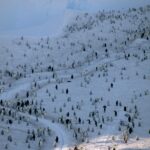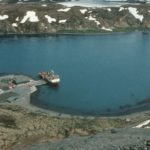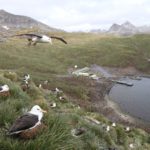It is now estimated that >30,000 whales visit South Georgia in summer, making this sub-Antarctic island the highest-density UK hotspot for recovering whales, including critically endangered Antarctic blue whales.
The majority of blubbery visitors are humpback whales, which are currently the most abundant species feeding in South Georgia in summer. However, Antarctic blue and southern right whales remain far from recovery, and substantial population increases are projected, doubling current numbers (see Antarctic blue and southern right whale projections here). Because of their previous rarity, whales were not explicitly considered in South Georgia’s conservation management planning until recently. With rapid abundance increases there is an urgent need to explicitly consider them in future management.
The Sustained Monitoring project aims to create a sustainable framework for the Government of South Georgia and South Sandwich Islands to monitor multi-season whale occurrence at South Georgia in relation to shipping, climate change, and other environmental indices in the South Georgia Marine Protected Area. This project is:
-Producing estimates of summer whale density for the north coast of South Georgia every year
-Monitoring year-round whale occurrence, vessel traffic, underwater noise, and acoustic masking using passive acoustic monitoring at the main visitor destination in Cumberland Bay;
-Developing risk-reduction protocols relating to ship-speed and noise regulations to improve environmental quality in important whale habitats, summarised in a South Georgia Baleen whale Action Plan;
-Identifying environmental drivers of whale occurrence for potential management action in relation to quota-setting for the krill fishery.
This project involves international collaborators from the following institutes: the Scottish Association for Marine Science, the International Fund for Animal Welfare (IFAW), the International Association of Antarctica Tour Operators (IAATO), HappyWhale, ORCA and the Polar Citizen Science Collective.
The project is also very grateful to the Government of South Georgia and the South Sandwich Islands for providing significant support and to the funders: Darwin Plus, the Blue Belt Programme, South Georgia Heritage Trust, and Friends of South Georgia Island.
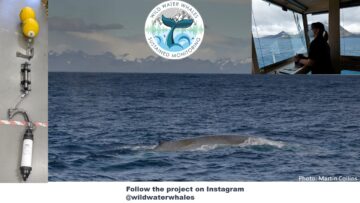
Field Update from Cumberland Bay Acoustic Moorings Deployment
Field Team members: KEP marine biologists Katie Wells and Rhianna Nichol and project manager Stephanie Martin
Greetings from King Edward Point (KEP). In January, we finally deployed two of the acoustic moorings in Cumberland Bay! This was after almost a year and a half in delays mainly due to large icebergs in the deployment area. It was too risky that the icebergs would damaged the moorings and ice is really noisy, so we wouldn’t be able to record whale vocalizations or ship noise.
The days before deployment were busy in Stanley, Falkland Islands, working in the BAS Stanley office warehouse, going through the Cumberland Bay mooring equipment. There were also meetings to discuss the mooring deployment plans with GSGSSI fisheries patrol vessel (FPV) Captain Simon, GSGSSI CEO Laura, and Workboat Service managing director Adam. The two BAS Stanley office people were also very helpful in coordinating the transport of all of the cargo onto the fisheries patrol vessel.
Captain Simon worked with BAS on the RRS James Clark Ross and has extensive experience deploring moorings. He was brilliantly helpful in planning and asking the FPV crew to help with mooring setup and deployment.
We arrived at KEP on the morning of 22 January and KEP marine biologists Katie Wells and Rhianna Nicol also joined the ship to help set up the sound traps and the acoustic releases.
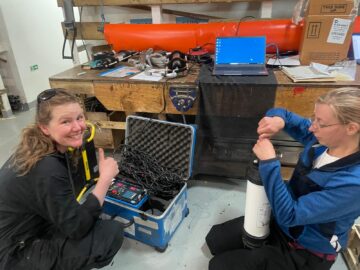
The following morning, 23 January, Captain Simon brought the FPV to the first mooring location. The FPV crew used the crane to deploy both moorings successfully. One of the deck crew members pointed out a whale blowing between the locations. It was blowing 35 knots, so we couldn’t tell the species from the deck, but it was a fantastic way to start, and hopefully, we captured our first data point!
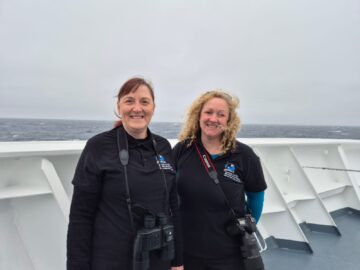
The ORCA teams have been sending messages about their whale sightings earlier in the season. They have been sharing real-time updates when they are in the Darwin Plus Hungry Humpbacks project working area between Stromness and St. Andrews. There was a chance to meet ORCA observers Nikki and Jayne, when they visited Grytviken and shared their sightings data.
Follow us @wildwaterwhales account on Instagram, LinkedIn, and BlueSky for more updates!



